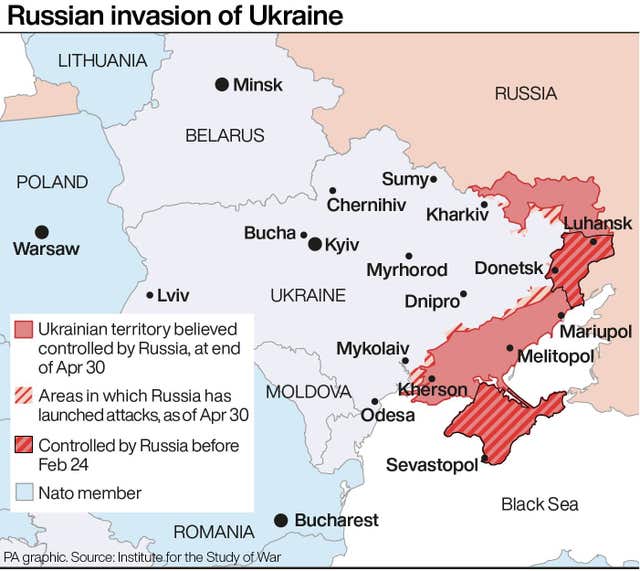Aid workers prepare stretchers and toys for Mariupol evacuees
A senior US official warned that Russia was planning to annex much of eastern Ukraine later this month.

Aid workers were preparing hot food, wheelchairs and toys for civilians slowly making their way to relative safety from the pulverised remnants of a steel plant in the city of Mariupol, besieged for months by Russian forces.
The plant is the last holdout of Ukrainian resistance in a city that is otherwise controlled by Moscow’s forces and key to their campaign in Ukraine’s east.
A senior US official warned that Russia was planning to annex much of the country’s east later this month.
At a reception centre, stretchers and wheelchairs were lined up, children’s shoes dangled from a shopping trolley and a pile of toys awaited the first convoy of civilians whose evacuation was being overseen by the United Nations and Red Cross.
Their arrival would represent a rare glimmer of good news in the nearly 10-week war sparked by Russia’s invasion of Ukraine that has killed thousands, forced millions to flee the country, laid waste to towns and cities, and shifted the post-Cold War balance of power in eastern Europe.
More than 100 people – including elderly women and mothers with small children – left Mariupol’s rubble-strewn Azovstal steelworks over the weekend and set out in buses and ambulances.
At least some were apparently taken to a village controlled by Russia-backed separatists. The Russian military said some chose to stay in separatist areas. In the past, Ukraine has accused Moscow’s troops of taking civilians against their will to Russia or Russian-controlled areas, something the Kremlin has denied.

Others left for the Ukrainian-controlled city of Zaporizhzhia, some 140 miles (230km) northwest of Mariupol. It was not clear why the evacuees’ journey was taking so long, but it is likely the convoy had to pass through heavily contested areas and many checkpoints.
Mariupol has come to symbolise the human misery inflicted by the war. A Russian siege has trapped civilians with little access to food, water and electricity, as Moscow’s forces pounded the city to rubble.
The plant, where about 1,000 civilians sought shelter along with some 2,000 fighters who have refused to surrender, has particularly transfixed the outside world.
Mariupol deputy mayor Sergei Orlov told the BBC that high-level negotiations were under way among Ukraine, Russia and international organisations on evacuating more people.

But Russia resumed its bombardment of the sprawling plant by air, tank and ship after the partial evacuation, Ukraine’s Azov Battalion, whose fighters are holed up in the mill, said on Monday on the Telegram messaging app.
After failing to take Kyiv in the early weeks of the war, Russia withdrew some of its forces and switched its focus to Ukraine’s eastern industrial heartland of the Donbas.
Mariupol lies in this region, and its capture would deprive Ukraine of a vital port, allow Russia to establish a land corridor to the Crimean Peninsula, which it seized from Ukraine in 2014, and free up troops for fighting elsewhere in the Donbas.
Michael Carpenter, US ambassador to the Organisation for Security and Co-operation in Europe, said on Monday that America believed the Kremlin planned to annex much of eastern Ukraine and recognise the southern city of Kherson as an independent republic.

Neither move would be recognised by the US or its allies, he said.
Russia was planning to hold sham referendums in the Donetsk and Luhansk regions in the Donbas that would “try to add a veneer of democratic or electoral legitimacy” and attach the entities to Russia, Mr Carpenter said.
He also said there were signs that Russia would engineer an independence vote in Kherson.
Mayors and local legislators there have been abducted, internet and mobile phone service has been severed and a Russian school curriculum would soon be imposed, Mr Carpenter added.

Ukraine’s government said Russia had introduced its rouble as currency there.
Getting a full picture of the unfolding battle in the east has been difficult because airstrikes and artillery barrages have made it extremely dangerous for reporters to move around.
Both Ukraine and the Moscow-backed rebels fighting in the east have introduced tight restrictions on reporting.
But so far, Russia’s troops and their allied separatist forces appear to have made only minor gains, taking several small towns as they try to advance in relatively small groups against staunch Ukrainian resistance.
The Russian military later said they had resumed strikes on the Azovstal steel plant.
Vadim Astafyev, a defence ministry spokesman, said Ukrainian fighters holed up at the plant “came out of the basements, took up firing positions on the territory and in the buildings of the plant”.
Mr Astafyev said Russian forces, along with rebel forces from Donetsk, were using “artillery and aircraft … to destroy these firing positions”.





